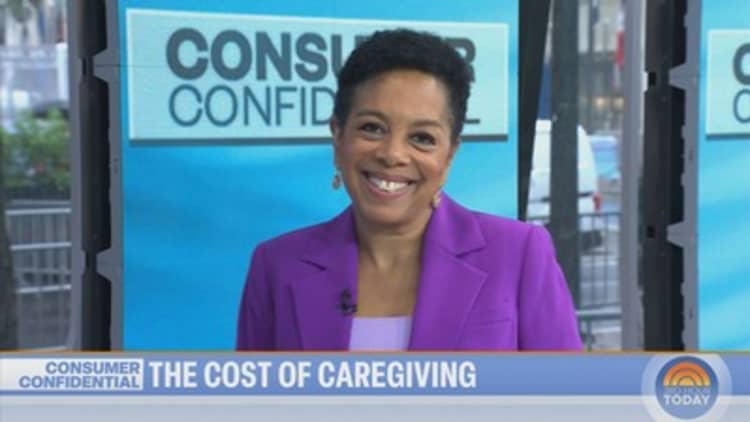Caregiving can require a significant investment of time and money, no matter your background, but Latino caregivers — particularly Latinas — tend to have more burdensome expenses.
Lea este artículo en español aquí.
It's worth being aware of those financial effects, experts say, because caregiving is an important touchstone in Latino culture. It's expected for family members to step in when someone needs help.
"It's just not a Latin thing to drop your parents or siblings off in an assisted living facility, it's not in our culture," said Plantation, Florida-based certified financial planner Marianela Collado. "It's a given that someone is going to take care of grandma or grandpa."
While it may be part of the cultural fabric to take family members under your care, it's important to make sure that you take the necessary steps to set yourself up before the financial commitment occurs.
"That's your typical Latino thing: You're not looking for a home for them, you're looking for which family member is going to move in and take care of them," added CFP Louis Barajas, CEO of International Private Wealth Advisors in Irvine, California.
Latino caregivers have high financial strain
Family caregivers spend on average 26% of their annual income on caregiving activities, according to a 2021 report by AARP. The organization calls that measure "financial strain," and bases it on the caregiving expenses relative to a caregiver's annual income.
Compared to other races and ethnicities, Hispanic and Latino caregivers have the highest financial strain, AARP found, with caregiving expenses that account for 47% of annual income. Broken down by gender, Hispanic and Latina women have financial strain of 56% — more than twice the overall caregiver average and the highest across all racial and ethnic groups and genders — while Hispanic and Latino men come in second at 38%, AARP found.
Hispanic caregivers are likely to report more financial impacts from caregiving than non-Hispanic whites, an earlier AARP report found. Those consequences might include leaving bills unpaid or paid late, moving to a less expensive area or difficulty affording basic expenses like food. What's more, Hispanic caregivers are more likely than non-Hispanic whites to have their work affected by caregiving, such as a need to leave work early, arrive late or take time off to provide care.
While disappointing, information like this is important, and can serve as a wake-up call for all parties involved. Here are a few financial strategies to better position yourself as a caregiver:
1. Explore claiming your family member as a dependent
There can be financial advantages to claiming a family member you are caring for as a dependent on your tax returns. It's a strategy you might employ in the U.S., or for a relative you're sending money to abroad. U.S. residents who routinely send money to family members in Mexico, for instance, may be able to claim them as dependents in their taxes under a treaty between the U.S., Mexico and Canada, said Barajas, a member of the CNBC FA Council.
In order to qualify as a dependent, the family member must meet specific qualifications around their income and their relation to you, said Collado, the CEO and co-founder of Tobias Financial Advisors. Additionally, you must prove that you provide more than half of the person's financial support for basic expenses.
Claiming your family member as a dependent can also open the door to deduct some of their medical expenses, as long as you meet specific criteria, Collado said.
"Make sure you're paying those institutions directly, such as doctors or hospitals," she said.

2. Look into local or state assistance programs
Some government programs pay a relative to care for an elderly or incapacitated family member, said Roberto and Amanda Corral of California-based special needs planning firm Corral Financial Strategies.
For instance, California offers in-home support services or IHSS, where a qualifying care provider can be paid for caregiving, explained Roberto Corral.
Primary caregivers may also consider respite programs, which pay an outside or secondary caregiver a set amount of hours a month to relieve labor from the primary caregiver.
"It doesn't give money back to their pocket but it helps with the emotional load," said Amanda Corral.
Further, if your loved one is eligible for Medicaid, depending on the state, there is a chance a family member can be paid for their caregiving services.
Find out if your loved one qualifies for a Medicaid long-term care program that pays family members. If they are a U.S. veteran, they may qualify for the Veteran Directed Care Program.
3. Build up your own financial safety nets
If you're a young worker and you anticipate taking care of a family member in the future, now is the time to get your own finances in order. Start by paying down high-rate debt, and install financial safeguards by investing in long-term goals like retirement.
You also should build up your emergency fund to weather unexpected expenses for yourself as well as those you will eventually be caring for. Consider financial products like high yields savings accounts, which keep your money readily available, Collado said.
If you're the main breadwinner of the family, it will be important to think about things such as disability insurance that help protect that income if you have a medical condition that leaves you unable to work.
"Disability insurance can soften the blow because, depending on the policy, you can get partial income," Amanda Corral said.






